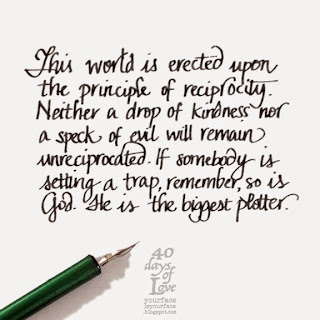On the way home from school today, my daughters were nattering away in the backseat. They can be very competitive, a game which the elder one understands and dominates. She made a comment to put the little one in her place. I asked my daughter, "Was that kind? Was that necessary?". She didn't understand.
I explained to her the idea behind this: before saying something, ask yourself if it is kind. If the answer is no, ask yourself if it is necessary. If the answer is yes, speak, but speak kindly. If it is kind but not necessary, then you can also say it. If the answer to both questions is no, then keep your words to yourself.
It got me thinking about how we use the various tools of communication at our disposal - be they words, actions, or silences. "Is it kind? Is it necessary?" is a filter you can use for all of these tools of communication, so you can use them for good, and not as weapons against others. It's a filter I myself want to use as often as possible starting now, since I know I've been ignoring it.
In my culture, expressiveness is encouraged, but only in certain forms. You'll have extremely melodramatic reactions to pretty much everything under the sun, as long as it's a trivial matter. When the turd really hits the fan, most people expect you to keep a "dignified silence".
Fortunately for me, I was not raised in this culture. I am a third-culture kid, and have had the luxury of adopting and adapting, finally creating my own culture and beliefs which are entirely unique to me. Not everyone would understand or agree with them, and that's fine by me, hence I don't discuss them with most.
Women in particular in the subcontinent are expected to keep a "dignified silence". I keep putting that term in quotation marks, because I scoff every time I come across it. What, in particular, is dignified about silence? How many hearts have been won by a stiff upper lip?
Alright, granted, if there's someone being a right twerp and doesn't deserve a response, the best and only thing to do is walk away. Then, silence is necessary, and perhaps also kind. But often, silence is the most passive aggressive weapon people use.
I chatted with a friend today who suffers from fibromyalgia - a debilitating, confounding, painful and untreatable disease. All you can do with FM is manage the pain. For a long time, this friend suffered in silence except for a few of us who knew. For starters, it took her the longest time to get diagnosed, because when you complain, people label you a "whiner", and nobody wants to have that emblazoned on their forehead, especially since people are fantastically judgmental when you complain about anything. When you start thinking about the number of people with problems that can be fixed, helped or managed who aren't getting any help because they are staying silent, it's infuriating.
The day my friend opened up about what she has on social media, she started receiving messages from people with similar symptoms, wondering if they might have FM, too. She had friends sending her good wishes, praying for her, trying to cheer her up. She found a supportive community online, providing her with both psychological and physical tips to have the best quality of life she can.
This proves that for every judgmental person who calls you a "whiner" and can't empathise, you'll find ten people who genuinely care about you, and even if they send you a smiley face, it can help you feel better. As the proverb says, "Shared sorrow is halved sorrow. Shared joy is double joy."
Lately, her physiotherapist told her, "When you suffer in silence, it means you are either staying sick or burdening one or two people in your life, which is unfair". What a fantastic point-of-view!
FM is an extreme case, and while most of us are fortunate to not have critically serious problems, everyone is carrying around their own baggage. The point is, you don't have to do it alone.
At the end of the day, whether it's your words, your actions, or your silence, ask yourself,
"Is it kind?
Is it necessary?",
before you proceed.
To be continued.










